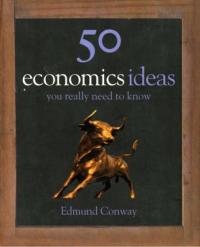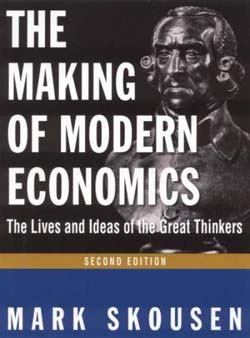Book Reviews (by Kim Gentes)
In the past, I would post only book reviews pertinent to worship, music in the local church, or general Christian leadership and discipleship. Recently, I've been studying many more general topics as well, such as history, economics and scientific thought, some of which end up as reviews here as well.
Entries in keynes (2)
50 Economics Ideas You Really Need to Know - Edmund Conway (2009)
 Thursday, January 17, 2013 at 1:44PM
Thursday, January 17, 2013 at 1:44PM  If you are trying to learn about economics there are a few different approaches you can take. First, you can study the classic documents, such as "The Wealth of Nations" (Adam Smith), "The General Theory" (J M Keynes), "The Road to Serfdom" (Hayek), "the Communist Manifesto" (Marx) and a few other seminal texts to gain an understanding of how the modern economic stream of study progressed in the last 3 centuries perhaps right up to current works from Friedman and even Laffer. But that approach is arduous and frankly too technical for most people to care to enage with. The second route is to take a college series of courses, which may run through these same ideas in summary by using texts such as survey books like "The Making of Modern Economics" (Mark Skousen) or other general survey books. But this second route maybe not provide a balanced outlook of the differing perspectives, since professors and writers of individual texts are prone to present support for their own beliefs rather than give a neutral view. The last route left for those of us who aren't trained economists is to read simpler books, written for the public.
If you are trying to learn about economics there are a few different approaches you can take. First, you can study the classic documents, such as "The Wealth of Nations" (Adam Smith), "The General Theory" (J M Keynes), "The Road to Serfdom" (Hayek), "the Communist Manifesto" (Marx) and a few other seminal texts to gain an understanding of how the modern economic stream of study progressed in the last 3 centuries perhaps right up to current works from Friedman and even Laffer. But that approach is arduous and frankly too technical for most people to care to enage with. The second route is to take a college series of courses, which may run through these same ideas in summary by using texts such as survey books like "The Making of Modern Economics" (Mark Skousen) or other general survey books. But this second route maybe not provide a balanced outlook of the differing perspectives, since professors and writers of individual texts are prone to present support for their own beliefs rather than give a neutral view. The last route left for those of us who aren't trained economists is to read simpler books, written for the public.
In that vein, one of the best books I've come across is simply titled "50 Economic Ideas You Really Need To Know". Author Edmund Conway has written a cogent and actually cohesive book that is less disjointed than the title might imply. Beginning with Adam Smith's "invisible hand" doctrine, exploring supply and demand, the Malthusian trap and opportunity cost, Conway guides the reader quickly and clearly through fifty (yes 50!) of the key concepts in economics. After having read several other books (from many of the 3 different approaches I mention above) on economics I found this layman's guide to not only be remarkably accurate and well written but well organized. Economics is often said to be a study of people and their uses of resources, including the decisions they make regarding those resources. Conway starts this book with a more pointed view saying -
Economics examines what drives human beings to do what they do, and looks at how they react when faced with difficulties or success.1
This turns out to be an excellent primer to understand how this book is approached and presented. Starting with the basic core of Smith's economic theory, the author moves from basic numerical balances (such as supply/demand) through philosophical ideas (such as communism, keynesianism, individualism) to measurements of economies (such as money, taxes, debt, unemployments) to finances and markets (such as stocks, bonds, credit markets etc) and finally to modern issues (such as creative destruction, global deficits, protectionism, technological revolutions). Each of these are readable as separate items (great if you need to learn about money markets or pensions without wading through an entire book), but Conway has blended the topics so well that the text is built into an excellent progression if you have the time to sit down and read the short 200 page book in a sitting or two.
For now, this is the best layman's summary book on economics that I have found. If you want a crash course- this is it. It's clear, concise, and takes great many pains not to be a partisan supporter of whatever school the author might have an affinity for. In fact, most economics books bleed their prejudices so clearly it is often obvious whether the writer is a proponent of Keynesian, Austrian, Friedman or any of the other streams of economic theory. Here, the theories are all presented and none derided. The pros and cons are pointed out for each. For this alone, I consider this short layman's guide to be solid gold, and far better than 90% of the detailed economic survey books available (which almost always take philosophical sides).
If you are looking for a one-book-fits-all, short summary of economics to get through in a day or so-- look no further than "50 Economic Ideas..." I can't give this book any higher praise than my unequivocal recommendation!
Amazon Link: http://amzn.to/V8Dpy8
Review by Kim Gentes
1. Conway, Edmund (2009-09-03). 50 Economics Ideas You Really Need to Know (50 Ideas) (p. 3). Quercus. Kindle Edition.
The Making of Modern Economics: The Lives and Ideas of the Great Thinkers, 2nd Edition - Mark Skousen (2009)
 Monday, September 3, 2012 at 3:32PM
Monday, September 3, 2012 at 3:32PM  There are very few studies which garner more yawns than economics. Despite it's practical application to literally every person, it's been popularly bantered about as boring and only understandable by the "math and theory geeks". As this book proves, nothing could be further from the truth.
There are very few studies which garner more yawns than economics. Despite it's practical application to literally every person, it's been popularly bantered about as boring and only understandable by the "math and theory geeks". As this book proves, nothing could be further from the truth.
For myself, as a student of history, I've been looking for a concise review of capitalism and the development of economic theory and thought in modern times. "The Making of Modern Economics" by Mark Skousen has impressed me as both a highly readable narrative and a diligent study of all the major people, theories, schools, history and events that shaped the landscape of modern economics. Skousen's transparent espousal of Adam Smith's foundation of natural liberty sets the tone for this capitalist understanding of this essential modern discipline.
Skousen navigates through 250 years of what amounts to revolutionary change in the way human beings work, think, save, spend, and manage resources. At its core, economics is the essential study of how humans deal with a world of resources constrained by scarcity. According to Skousen, Adam Smith is the first known figure to compile a major work that addresses the issue of economics and provides a structural framework for how understanding it can best deal with scarcity. The result is the nacient birth of the free market capitalist system that is built upon the theory of natural liberty that Smith proposes in the book, and which is counterbalanced by the impact of another of Smith's theories- the invisible hand.
Skousen postulates that Smith provided the "house" on which all economic thought has been built since. But more than just giving his philosophical grading to Smith, Skousen traces person by person through history- comparing each character's work against the original ediface constructed by Smith (and against one another). In doing this, Skousen creates a narrative that is bound to the benefits of free market capitalists. Characters that wrote and taught theories opposing Adam Smith (such notables as Marx and Keynes) are given clear articulation in points both positive and negative. Likewise, advocates such as Milton Friedman and Friedrich Hayek each recieve sections celebrating their comebacks and chastising their errors.
This book leaves most of the minute details of economic data and statistical study out of the text (or relagated as references), which makes it an historical study more than an econometric or financial review of theories. As a readable, understandable and enjoyable history, this book is exceptional. If you are a free market advocate, it will be a delight. Skousen clearly has written this as much as a defence of Smithian economics as he has for an historical understanding of the development of political economy into modern economics. But he succeeds at both!
Really, if you have any interest in the story of freedom as it is manifested in the light of economics, then this book is a "must read". Thoughtful and enjoyable writing on every page (of which there are nearly 500).
Amazon Book Link: http://amzn.to/PXGbVZ
I strongly recommend this book! Available in multiple formats. I read it in Kindle eBook format and listened to part of it in Audible book format. It is also on paperback and hardback.
Review by Kim Gentes
 adam smith,
adam smith,  capitalism,
capitalism,  economics,
economics,  economy,
economy,  entrepenuer,
entrepenuer,  free market,
free market,  freedom,
freedom,  friedman,
friedman,  history,
history,  keynes,
keynes,  political economy,
political economy,  socialism in
socialism in  Economics,
Economics,  Geopolitical,
Geopolitical,  History,
History,  Leadership,
Leadership,  Resource,
Resource,  Science,
Science,  Society
Society